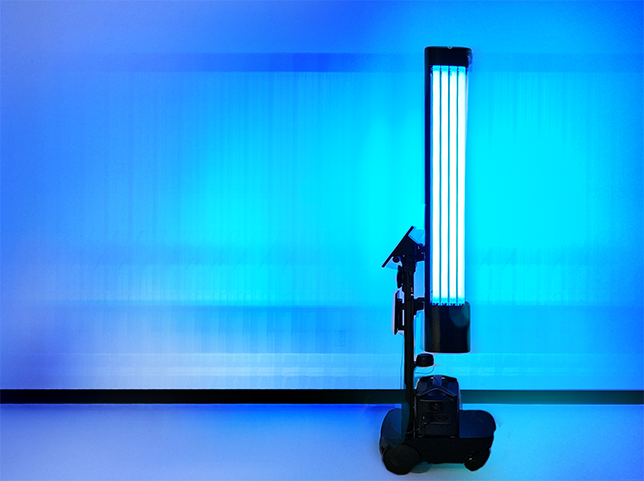OhmniLabs Debuts UV-C Cleaning Robot
Robotics company OhmniLabs recently debuted an autonomous cleaning robot that uses UV-C light to disinfect spaces. The robot, OhmniClean, weighs in at 58 pounds, making it the lightest such product in the world, according to a news release. OhmniClean is capable of disinfecting a 3,000-square-foot space in less than 15 minutes and was designed for use in schools, hospitals, hotels and other spaces that require deep cleaning of high-touch surfaces.
“We developed OhmniClean to address a critical need in the market for fast, simple and effective disinfection," said Tra Vu, Chief Operating Officer at OhmniLabs. "At a time when sterile cleaning and infection control are top of mind, OhmniClean is helping to restore normalcy by simplifying existing cleaning processes and making disinfection more intelligent through providing access to efficacy and compliance data. In addition, OhmniClean is made in the U.S.A., so we are able to bypass global shipping and supply chain issues currently faced by other manufacturers.”

Photo courtesy of Joseph Milholland (Lightspeed PR)
A press release notes that UV-C light has been proven to reduce bacterial counts on high-touch surfaces and that SARS-CoV-2 (the virus that causes COVID-19) is particularly vulnerable to this type of ultraviolet light. Independent testing has confirmed that OhmniClean’s consistent 254-nm UV-C disinfection is effective against pathogens like MRSA, VRE, P. aeruginosa, E. coli and SARS-CoV-2 with a 99.999% efficacy rate, according to the press release.
“The OhmniClean robot is incredibly easy to use," said Hector Garcia, President of ProClean Janitorial. "My team was able to get it up and running after just ten minutes of training. The robot's autonomy allows our staff to clean multiple rooms while the robot disinfects other areas of a property. The whole process is quick and efficient.”
OhmniClean offers a short cleaning cycle time that allows a single person to manage a small fleet capable of disinfecting multiple rooms simultaneously. The automated UV-C disinfection solution also reduces both human error and the risk of injury from mixing cleaning products or handling heavy equipment. The robot features motion sensors, remote switches and an active safety system.
About the Author
Matt Jones is senior editor of Spaces4Learning. He can be reached at [email protected].